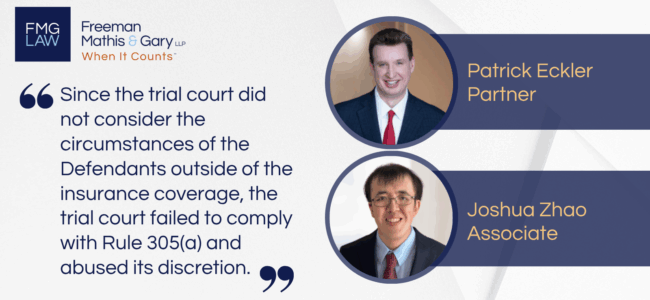BlogLine
Illinois trial courts must adhere strictly to Supreme Court Rule 305(b)
6/10/25

By: Donald Patrick Eckler and Joshua W. Zhao
Over two decades after Rule 305 was amended to deal with the sufficiency of security of judgment after a $10 billion judgment against Philip Morris was unable to be secured, in a matter of first impression, the Appellate Court of Illinois, 1st District in Walsh v. Sklar et al., 2025 IL App (1st) 231830-U, held that a trial court abuses its discretion when it allows a judgment to be secured by other than a bond without “demonstrating the adequacy of such other security.”
A bond or security is critical to the appeal process as it ensures enforcement of a money judgment. The rule of thumb for the amount of an appeal bond is 150% of the judgment amount in order to account for interest and costs while the matter is on appeal. In Illinois, post-judgment interest runs at a statutory rate of 9% per annum.
Maureen Walsh brought this action against Defendants in the Circuit Court of Cook County, alleging negligent podiatric care between December 2016 and June 2017. At trial, the jury returned a verdict in Walsh’s favor and awarded Walsh $2,865,495. Defendants moved for a new trial, which was denied. The defendant appealed.
Defendants then moved for approval to file their policy of insurance in the amount of $1.85 million to secure the judgment while the matter was appealed. The trial court approved the tender of the policy and Walsh moved to reconsider, arguing that the insurance policy for $1 million less than the judgment, did not comply with Illinois Supreme Court Rule 305(a) because the amount was not for the amount of the judgment and costs plus interest. The motion to reconsider was denied. Walsh appealed following the denial of her motion to reconsider the sufficiency of the security for the judgment.
On appeal, the appellate court affirmed the denial of Defendants’ motion for a new trial but held that the trial court abused its discretion in approving the tendering of the policy when the other security offered did not comply with Rule 305(a). Rule 305(a) requires that an appeal bond or other security be sufficient to cover the amount of the judgment and costs plus interest.
There is a narrow exception that allows the appeal bond or other security to be less than the judgment and costs plus interest if the judgment debtor’s assets and the assets of its insurers and indemnitors show that the full amount is not reasonably available to the judgment debtor. Here, the Defendants did not present any evidence to suggest they would have to declare bankruptcy to pursue an appeal if required to provide the full amount of the judgment. Further, the Defendants did not provide evidence that they did not have assets outside their insurance coverage that could cover the remainder of the judgment and costs, plus interest. Since the trial court did not consider the circumstances of the Defendants outside of the insurance coverage, the trial court failed to comply with Rule 305(a) and abused its discretion.
Separately, the appellate court found that the trial court erred as it did not impose conditions upon the Defendants, even though the amount posted was less than the judgment and costs plus interest. The appellate court noted that the committee notes to Rule 305(a) make it clear that such conditions must be imposed in such circumstances, and the trial court did not have discretion to not impose the conditions.
This case demonstrates that trial courts must comply with the strictures of Illinois Supreme Court Rule 305(a). The trial court cannot limit its consideration of a judgment debtor’s assets to the judgment debtor’s insurance coverage and must consider the full circumstances of a judgment debtor’s assets, including potential assets outside the insurance coverage. Further, the trial court must impose conditions if the judgment debtor is unable to provide sufficient security.
For more information, please contact Donald Patrick Eckler at patrick.eckler@fmglaw.com, Joshua W. Zhao at josh.zhao@fmglaw.com or your local FMG attorney.
Information conveyed herein should not be construed as legal advice or represent any specific or binding policy or procedure of any organization. Information provided is for educational purposes only. These materials are written in a general format and are not intended to be advice applicable to any specific circumstance. Legal opinions may vary when based on subtle factual distinctions. All rights reserved. No part of this presentation may be reproduced, published or posted without the written permission of Freeman Mathis & Gary, LLP.
Share
Save Print
